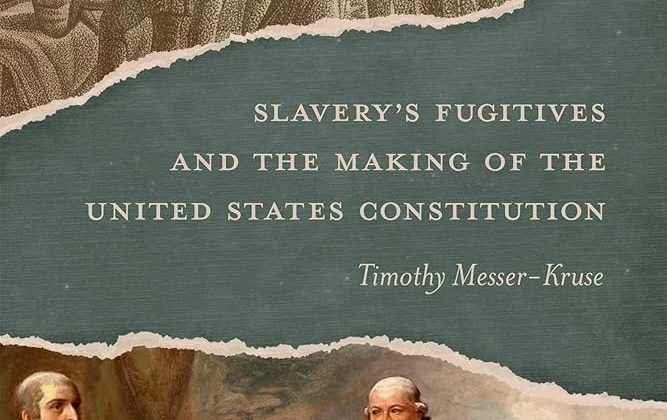

Timothy Messer-Kruse is Professor in the School of Cultural and Critical Studies at Bowling Green State University. This interview is based on his new book, Slavery’s Fugitives and the Making of the United States Constitution (LSU Press, 2024).
JF: What led you to write Slavery’s Fugitives and the Making of the United States Constitution?
TM: I’ve long been interested in the debates that swirl around the curious events that remade the American state in the 1780s. What we call the “Constitutional Convention” would in any other country have been described as a bloodless coup as it was a wholesale remaking of the nature of government. I’ve never been satisfied with the standard explanations: that after a decade of functioning America’s leaders suddenly realized the old Articles of Confederation were unworkable and resolved to improve upon them. Generally such fundamental changes in government only happen after a deep crisis or struggle and I had yet to hear an explanation that drew attention to either. Some have argued that the kerfuffle in Massachusetts known as “Shay’s Rebellion” was such a crisis, but it was so weak and limited that Boston’s elites were able to quell it on their own. Some have pointed to Congress’ inability to get the states to pay their full share of federal expenses, but this was a problem that had been present since the Articles were drafted and the patriots seemed resigned to living with. I thought there had to be something deeper lurking behind this mystery and I imagined it must be something embarrassing to the celebratory chroniclers of the nation or it would have been long revealed.
In the midst of writing another book that turned a critical eye towards the rhetoric and ideas of white abolitionists in the founding of the U.S.A. (The Patriots’ Dilemma: White Abolitionism and Black Banishment in the Founding of the United States of America, Pluto Press, 2024) I ran across many self-proclaimed abolitionist patriots (such as Alexander Hamilton, John Jay, and Benjamin Franklin) who, in spite of their anti-slavery views, demanded that Great Britain return to American enslavers the thousands of fugitives from slavery they had promised sanctuary. I realized this was the one issue that connected all the live wires of the day: slavery, imperial rivalries, and the question of federal supremacy and state autonomy. This was the issue that could not be contained by the old Articles of Confederation and demanded a restructuring of government to resolve. I had my answer.
JF: In 2 sentences, what is the argument of Slavery’s Fugitives and the Making of the United States Constitution?
TM: Alone among all the factors that led to the Constitutional Convention, the one that could not be resolved or even compromised within the terms of the existing federal charter was the refusal of several key states to abide by the terms of the Treaty of Paris with Great Britain. Their refusal, which was resolved by the new Constitution’s federal supremacy clause and the creation of a federal judiciary, was sparked by Great Britain’s refusal to hand back to their masters thousands of fugitives from slavery.
JF: Why do we need to read Slavery’s Fugitives and the Making of the United States Constitution?
TM: We can not understand either the origins of the Constitutional Convention or the reasons that the Constitution took the form that it eventually did without recognizing the centrality of the issue of federal supremacy in upholding treaty agreements with foreign nations. We can not understand why the treaty issue was so explosive at this moment without detailing with how tens of thousands of enslaved people took advantage of the Revolutionary War to liberate themselves, the role of the British in providing them with sanctuary, and American policymakers demands in the Treaty of Paris that they be bodily returned to face the wrath of their owners. All of these vital connections and causes have been obscured and forgotten by time and bigotry.
JF: Why and when did you become an American historian?
TM: I think I’ve always been a historian, even before I learned to practice it as a craft. I’ve always been curious and questioning of the conventional accounts of things and once I discovered there was always “more to the story” I couldn’t stop digging. My career as a historian began when my wife said, “all you do is read those old books, you should just go to grad school and get paid for it.”
JF: What is your next project?
TM: I am currently elbows deep in researching the origins of civics education in America. I am discovering that this is also a dark and intentionally forgotten story that connects antebellum Yankee reformers, the nation’s richest families, Irish immigration, the Supreme Court, the rise of Jim Crow racism, the professionalization of “Political Science”, and the reunification of the broken halves of the nation after the Civil War. It is quite a volatile mixture that I can’t wait to uncork.
JF: Thanks, Timothy!